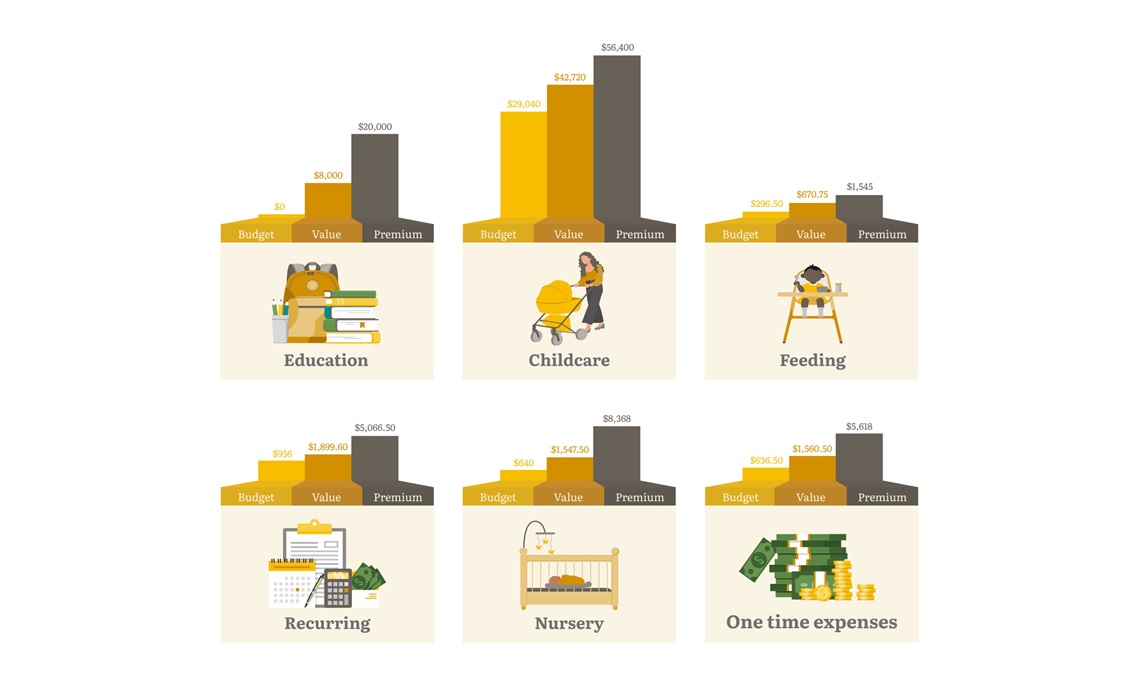What Happens to Your Budget When Baby Arrives on the Scene?

You’ve just brought home your bundle of joy – congratulations!
Money may not be the first thing on your mind, but as your little one starts to consume more of your household budget on a weekly and monthly basis than you anticipated, it may come to the forefront. Questions that seemed easy to answer before you were sleep deprived now leave you pondering how such a tiny human cost so much?!
Even high-income earners with healthy cash flow are surprised by the impact a child’s birth has on their short-term cash flow and long-term savings. After the upfront costs of building out a nursery (Pottery Barn Kids makes a $5000+ nursery build out happen in the blink of an eye!), upwards of two thousand dollars a month that used to automatically be deferred to saving or investing is now taken right off the topline of your family’s balance sheet.
Unfortunately, two thousand a month is a conservative baseline figure, barely covering the core need of daycare. Double or triple that figure for a more realistic view that includes feeding, clothing, entertaining and socializing your baby.
In our years of working with high income couples – especially ones whose career success has led them to welcome a child later in life – we have noted that having a baby can hit the family budget especially hard. It may sound counterintuitive, but the benefit of being a high-income earner is that budgeting is often unnecessary. When family household cash flow is strong, couples may not closely monitor spend because it doesn’t “feel” necessary.
While adjusting to life with a newborn, a Snoo, support from night nurses, lactation consultants and sleep coaches understandably feel like necessities, not luxuries. In baby’s first four weeks home, it’s not uncommon to spend thousands more dollars than anticipated in a mere effort to get a few hours of sleep.
And because you want to give your child the best advantages in life – from organic baby food to Montessori-based toys to a well-qualified nanny who strolls your little one in an Uppababy – the costs of raising a child can significantly disrupt a previously healthy financial flow, veering your financial glidepath off course.
That’s why we put together a practical guide to help new parents adjust to the household cash flow impact of a new baby. Our goal is to empower you with real world perspective and options to empower your decision making when building your family’s new baby budget.
Our goal is to help you offload some of the burden of thinking through financial matters so that you can focus on what matters most: appreciating the joys of life with your new child.
Create a Straw Man Budget
While you get used to financial life with your little one, it’s a good idea to sketch out a new high level household budget. It doesn’t need to be complicated, but even a back of the napkin snapshot of new expenses will help you contextualize just how much money is no longer readily available.
Warning: it may be uncomfortable (or even shocking!), but seeing how many thousands of dollars you’ve “invested” in top-of-the line gear before baby even arrived is the eye-opener many new parents need to help them determine where they really should “invest” in their child’s future vs. taking a more conservative approach to spending.
As baby gets older and one or both parents return the work, the expenses only escalate with childcare, travel to introduce baby to long distance family, and modifying your home environment to accommodate your tiny human.
Develop New Savings Goals
The “didn’t see that coming” moments of parenthood never seem to end. Whether it’s suddenly needing a new washer/dryer (easily a $5k hit) due to the massive uptake in laundry wear and tear or the ear tube surgery with out-of-pocket costs in the thousands because you haven’t yet met your annual deductible, keeping cash on hand is critical once baby is on board.
However much cash you used to keep on hand for unanticipated needs such as major household and auto expenses (new roof, new car), it’s smart to double it. Vacations for you and your partner used to have a clear, fixed cost. Are you now traveling with a nanny? Double the cost of the trip for her fees, airfare, room and board.
On top of these short-term savings goals you were already familiar with and the long-term savings habits you’d built (e.g,. retirement savings such as 401(k) contributions), you have new savings accounts to open for your child’s future education. Regardless of what primary school and university education route your child takes, if you plan on private school at any time in their educational future, contributing to a 529 plan early and annually can be beneficial. (Note: we offer more in depth 529 plan guidance in a separate piece).
Prepare for Childcare
Paying for childcare can be like paying for college twice. Depending on the price of your daycare or nanny, it can add up quickly and equate to college tuition prices. Yet you didn’t have 18 years to prepare for the expense!
As a rough rule of thumb, the cost of a high quality daycare costs what a high quality one bedroom apartment does in your neighborhood. In major metro areas, $2000 a month is a common starting point for 40-50 hour/week daycare coverage for infants.
Costs for high quality nannies is also variable by market, but $48,000 a year as a baseline for taking on this household employee is a good figure to keep in mind.
Many factors influence the decision of whether to pursue daycare or a nanny (shared or private) for your infant. Once again, we offer more in depth education on this topic in a separate piece.
While less of an impact on your overall budget, you’ll also want to factor in the cost of a good babysitter for date nights and events. A reputable and safe babysitter can cost $25 an hour. Two date nights a month (if you’re ambitious!) and a few hours of coverage each weekend can quickly add up to $500 a month, or $6000 a year.
Plan for Protection
Do you need life insurance now that you have a dependent? Or will you be able to self-insure your child’s lifetime needs in the event of an unthinkable catastrophe? And how do you know the answers to these questions?
Analyzing whether your family is self-insured or will require life insurance requires thoughtful, expert planning. As wealth advisors, we can work with you on this analysis and connect you with trusted resources for estimates on life insurance products that may be appropriate for you, should they be needed.
And while many couples found an estate plan unnecessary before baby, it’s imperative to put in place legal documents that solidify your new baby’s guardianship and financial stability. Creating solid, basic estate planning documents generally costs around $1500-2000. Our team is happy to connect you with a legal resource to create these documents should you need a referral.
Find the Right Wealth Manager
By now, you’re likely gaining clarity about how much more expensive and complicated your financial life became the moment you brought baby home. It can feel overwhelming, but just as the night nurses swoop to your aid, a wealth manager can work with you to provide peace of mind that will hopefully help you rest a bit easier.
While you focus on adjusting to a new schedule and returning to work life, our job is to absorb the financial planning and implement an investment strategy that addresses your unique goals for your family’s future.
We are here when you’re ready to talk about what it means to you and your family for your wealth and life to appreciate together.


